Newsflash - Employer Offence to Allow Breach of Self-Isolation
(1)_1000.png)
Employer Offence to Allow Breach of Self-Isolation
New laws came into force on 28 September in England which set out obligations on employers to ensure workers (and agency workers) self-isolating do not attend their workplace or other places for work business.
Obligations on workers & agency workers
The general requirement under the relevant regulations require individuals to self-isolate for between 10 and 14 days where, after 28 September, they have tested positive for Covid-19 or been in close contact with someone who has tested positive. Self-isolation requirements are also imposed where someone has travelled to or via a non-exempt country/territory.
Once the worker is aware of their requirement to self-isolate, if they are due to carry out any work or activities related to their work during their isolation period, which would take place outside of their home (or the place they are isolating), then they must notify you as their employer as soon as possible and certainly before they are due to start work, of:
- their requirement to self-isolate; and
- the start and end dates of their isolation period.
Given that many office workers are now back working from home, it may be that this notification requirement is not triggered in many cases and the employer may remain unaware of the fact that their worker is currently self-isolating. Similar provisions apply to agency workers whom you may engage. They must notify either their agency, you as the end user for whom they are working and/or their employer of the same information as the workers’ obligations above.
Employer obligations
As soon as you are aware of a workers/agency workers requirement to self-isolate, it is an offence if you “knowingly” allow that individual to attend any place other than the designated place in which they are isolating (usually their home), during the isolation period, for any purpose related to the individuals work. This means you can allow them to work from home if their job can accommodate this.
- to seek medical assistance, where this is required urgently or on the advice of a registered medical practitioner, including access to dentists, opticians, audiologists, chiropodists, chiropractors, osteopaths and other medical or health practitioners or services relating to mental health); or
- to access veterinary services, where this is required urgently or on the advice of a veterinary surgeon
- to fulfil a legal obligation, including attending court or satisfying bail conditions, or participating in legal proceedings
- to avoid a risk of harm
- to attend a funeral of a close family member
- to obtain basic necessities, such as food and medical supplies for those in the same household (including any pets or animals in the household) where it is not possible to obtain these provisions in any other manner
- to access critical public services, including social services, and services provided to victims (such as victims of crime)
- to move to a different place where it becomes impracticable to remain at the address at which they are.
Criminal Offences
Individual workers and agency workers who fail to notify their employers or fail to self-isolate can be subject to a fixed penalty notice, or an offence resulting in a fine.
Steps to take
It would be sensible to communicate to your staff, in writing, their obligation to notify you of their requirement to self-isolate and the start and end dates, as soon as they become aware themselves of this and the restrictions placed on them whilst self-isolating. It is also sensible to have a central contact to whom such notifications in writing must be made.
We are here to help
Related content
.png)
This blog is based on Judicium’s SEND ‘Sofa Session’ from the 20th of November, with our resident expert Rik Chilvers.
.png)
This summary is based on Judicium’s Employment Law ‘Sofa Session’ from the 13th of November, with our resident experts Jenny Salero, Kelly Rayner and Suzanne Ravenhall

This blog is based on Judicium’s Health and Safety ‘Sofa Session’ from the 6th of November, with our resident expert Isthar Pearce.

Effective from 26 October 2024, schools, Multi-Academy Trusts (MATs), and all employers in the UK will be legally required to take proactive steps to prevent sexual harassment in the workplace.
.png)
This blog is based on Judicium’s Health and Safety ‘Sofa Session’ from the 23rd of October, with our resident expert Andy Camroux.

This blog is based on Judicium’s Health and Safety ‘Sofa Session’ from the 16th of October, with our resident expert Rachel Kitchen.


Sofa Sessions | SEND